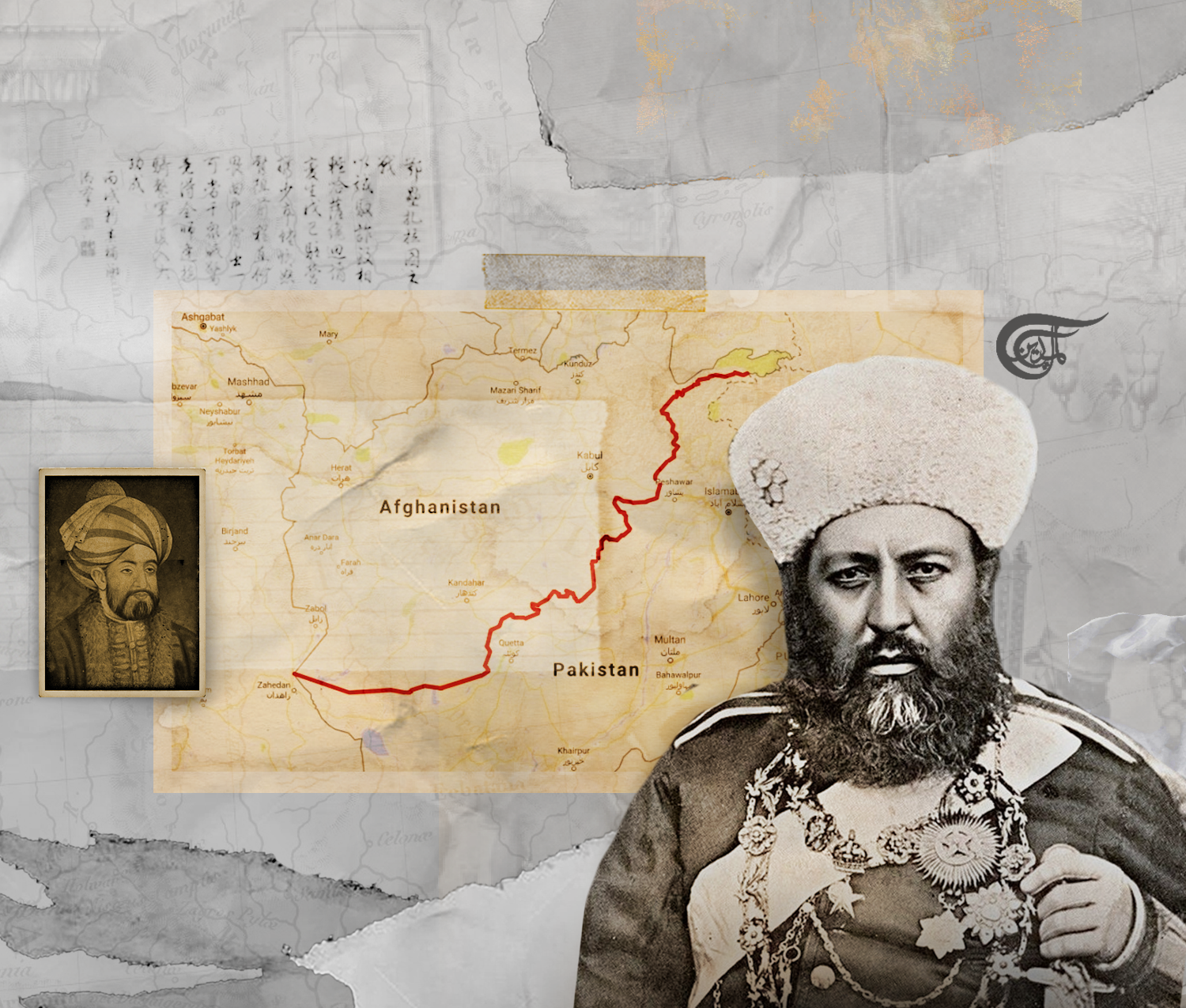Khorasan: The Eternal Battlefield... and the Bleeding Heart of Asia - Chapter 4
A historical recount of the successive rulers that governed in the era of the Pashtuns.

Pashtun Rule
Mahmud Hotaki
When the Pashtun Mahmud Hotaki of the Ghilzai tribe from Kandahar conquered Isfahan and ended the rule of the Safavid Empire (1720), he proclaimed himself king of Iran. He had not attacked a foreign state but simply rebelled against the central government of his own country. (Before him, his father Mir Wais Hotaki had risen up against the mismanagement and corrupt administration of the central government in Isfahan and established his own rule, which, however, was restricted to Kandahar (1709).)
Both Hotaki uprisings were justified in light of the Safavids' poor governance and oppression of the people of Kandahar. It is possible, as some historians maintain, that the Safavid proclamation to instate the Shia faith as the official denomination throughout Greater Iran played a role in the uprisings of the Pashtuns, the majority of whom belong to the Sunni denomination. Yet there is no historical documentation for this hypothesis, which means that these two uprisings probably had no ethnic or religious motives. As a matter of fact, Mir Wais' rule over Kandahar and his life were both ended by his own Pashtun tribesmen. And Mahmud Hotaki was eventually assassinated at the behest of his cousin Ashraf Hotaki, who then assumed power.
The brief Hotaki rule over all of Iran was then terminated by Nader Afshar, a Turkmen general of the Safavids.
After Nader Afshar defeated and expelled the Ghilzai Afghans (the Ghilzais had meanwhile departed to the Mughal dominated areas of India, which Nader later used as a pretext to attack India), he founded the Afsharid Dynasty in Western Iran and recruited members of the Abdali tribe (also known as the "Dorrani") into his army.
Amongst the Abdalis was a young man from the Pashtun aristocracy named Ahmad Khan Abdali, who embarked on a stellar career with Nader, rising to become his personal advisor, confidant and leading general of the Pashtun forces in Nader's army.
After Nader was assassinated by his own generals, West Iran plunged into a devastating civil war. Seizing this as an opportunity, the ambitious Ahmad Khan summoned Pashtun tribal leaders in Kandahar with the aim of having them proclaim him king. But to convince them, he needed the assistance of Saber Shah Kaboli, a dubious cleric from Punjab (now in Pakistan) who was highly respected amongst the devout Pashtuns; in the meantime he would keep a low profile. After nine days of deliberations and disputes amongst the various tribal leaders, Saber Shah intervened in the proceedings and duly declared Ahmad Khan king (1747). Some historians argue that Saber Shah was actually an agent of the British "East India Company", which, as a trading company alongside other competing foreign (French, Dutch, Russian) trading agencies, conducted its activities with the aim of paving the way for the British colonisation of India.
The consequences of this operation are well known in the histories of India, Afghanistan and Pakistan.
Ahmad Shah Dorrani
Ahmad Khan Abdali, now king of Khorasan and known as Ahmad Shah Dorrani, was ambitious enough in his intention to extend his rule over all of Iran and also India (at least parts of it). Given the conditions in West Iran at the time (its lack of a strong central government, the bloody battles amongst numerous pretenders to the throne and local rulers), it would not have been too difficult for him to achieve this goal. But instead of advancing westward and conquering the rest of Iran, he moved eastward, to India, which was under the reign of the powerful Marhatta state, bellicose Sikhs and remnants of the Mughal Dynasty. He ended up invading and partially occupying parts of India ten times (1747-1769). Apart from looting, destruction and the mass murder of India's soldiers and civilians, he left no other memory behind.
Ultimately Ahmad Shah Dorrani's India campaigns only served to undermine the strength of the Marhatta state and other local Indian rulers, so that the British met little resistance in seizing all of India as their colony.
-

Ahmad Shah Dorrani
Following the creation of the Afghan (Pashtun) kingdom, the hitherto indirect interference of the British colonial power in the region picked up speed and turned into direct interference and later full-scale military intervention. (It had always been the aim of the British to seize India ahead of their rivals France and Russia.)
In order to achieve their colonial conquest of India, the British first had to crush and divide Iran... and then weaken or completely eliminate the powerful Marhatta state in India. They left this particular task to "the Afghans" (the Pashtuns), who duly delivered the result: "mission accomplished"...
After the death of Ahmad Shah Dorrani, his son Timor Shah Dorrani was able to rule for 20 years in a relatively calm but extremely unstable Khorasan (1773-1793). Timor, however, then had 21 sons who began a fratricidal war amongst each other for power after his reign and turned the whole of Khorasan into their private battlefield. The British, and to some extent Russia, were also involved... The British twice occupied parts of Khorasan, as well as the cities of Kabul, Peshawar and Kandahar. While Timor's sons repeatedly turned to Great Britain for support, the population fought bloody battles against the British occupiers and succeeded in routing them in two wars with heavy losses (1839-1842 / 1878-1880).
In the history books of Afghan state historians, the non-Pashtun population of Khorasan barely figure in the period of the Pashtun fratricidal war.
These turbulent circumstances lasted until 1880 and resulted in: the ultimate partitioning of Iran; the loss of large territories of the empire that had been consolidated by Ahmad Shah to neighbouring states, especially to British India; an economically and culturally devastated Khorasan; the weakening and marginalisation of other ethnic groups, especially the "Tajiks"; and the admission of colonialism into the country and the region. These outcomes reverberate to this day...
Abdoll Rahman Khan
In 1880, the British finally found "their man": Amir Abdoll Rahman, a "prince" and founder of the Barakzai clan of the Abdali tribe.
Abdoll Rahman Khan submitted himself entirely to the British. In his memoirs, he writes that he was only concerned with maintaining his personal power and rule and was therefore willing to do anything to serve British interests in return for British support. Both sides got what they wanted... He received an annual salary directly from the British government and had a free hand in domestic politics but no independence in foreign affairs. His reign was drenched in a sea of blood, terror and torture. With utmost despotism and brutality, he subjugated all the inhabitants of Khorasan while securing rule for himself, his descendants and the Pashtun feudal elites. He incited ethnic groups against one another, his strongest troops consisting of Pashtun tribes – a policy practiced by all the governments in Kabul up to the 1970s. The group worst affected by Abdoll Rahman Khan's barbarism was the Hazara population. During the brutal suppression of the Hazara uprising, he issued the order for their genocide. Almost 60% of the Hazara population were exterminated. The survivors – mostly women, boys and girls – were abducted and sold as slaves. Part of the proceeds from the sale of the slaves by Pashtun warriors went to the treasury (to him personally).
After the massacre, the Hazara mothers had a familiar saying when their children disobeyed: "If you don't listen, the 'Aughu' ('Afghan' in Hazara dialect) will come and eat you."
-

Amir Abdoll Rahman Khan
In the official history of Afghanistan, Amir Abdoll Rahman Khan is presented as the founder of "modern" Afghanistan because he carried out some reforms, brought security and stability to the country, built roads and secured the country's borders. But all his "good" deeds pale in the face of the genocide of the Hazaras and his numerous other crimes.
In 1893, the British wanted to resolve the frontiers of their Indian colony by drawing a new border between "Afghanistan" and British India. Amir Abdoll Rahman Khan readily accepted and signed the proposal put forth by the British Foreign Minister of the Indian Crown Colony "Henry Mortimer Durand". The Durand Line ended up dividing the Pashtuns, cutting right through the middle of their largest inhabited territory, which to this day continues to generate tensions and conflicts between Afghanistan and Pakistan – the two heirs of British colonialism. In acquiescing to the British, the Amir also betrayed and sold out his own tribesmen. (Incidentally, Amir Abdoll Rahman Khan had attempted to destroy the Buddha statues in Bamyan with cannons – way before the Taliban finally succeeded in doing so in 1996.)
-

The Durand Line

 Tariq Marzbaan
Tariq Marzbaan
 8 Min Read
8 Min Read












